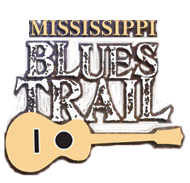Robert Johnson Gravesite
Robert Johnson Gravesite - Greenwood
A seminal figure in the history of the Delta blues, Robert Johnson (1911-1938) synthesized the music of Delta blues pioneers such as Son House with outside traditions. He in turn influenced artists such as Muddy Waters and Elmore James. Johnson’s compositions, notable for their poetic qualities, include the standards “Sweet Home Chicago” and “Dust My Broom.” Johnson’s mysterious life and early death continue to fascinate modern fans. He is thought to be buried in this graveyard.
One of the most famous and legendary Delta blues musicians is Robert Johnson (1911-1938). Although he recorded only twenty-nine songs at two recording sessions in 1936 and 1937, his work has been included in the repertoires of countless blues and rock musicians since. Johnson’s songs “I Believe I’ll Dust My Broom,” “Cross Road Blues,” “Love in Vain Blues,” “Traveling Riverside Blues” and “Sweet Home Chicago” became well known via the recordings of Elmore James, Eric Clapton, the Rolling Stones, Led Zeppelin and many others.
Johnson was born in Hazlehurst, Mississippi, but by 1920 he was living near Robinsonville, just south of Memphis. In the late 1920s, he took up the guitar and was learning to play from Willie Brown, Charley Patton, and Son House. By 1931, Johnson had returned to the Hazlehurst area and begun studying with local bluesman Ike Zinnerman, generally accepted by scholars as the most important influence on Johnson and his revolutionary, modern style.
From 1933 on, Johnson traveled around the Delta and to other parts of the country including Memphis, St. Louis, Chicago, Detroit, New York, and even Canada. Johnson went from one jook to another, never settling in one place, although he did have a home in Helena, Arkansas, for a time. Late in 1938, impresario John Hammond planned to present Johnson as part of the “From Spirituals to Swing” concert at Carnegie Hall, an appearance that would have undoubtedly made him an international star. Unfortunately, Johnson died before that event. He was allegedly poisoned by the angry husband of a woman he was seeing. He died on Star of the West plantation just south of this site on August 16 and was buried here the following day.
Some believe the myth that Johnson sold his soul in exchange for remarkable guitar-playing skills that would make him famous, and the story of his fateful meeting with the devil at a rural crossroads is an enduring blues theme. Bluesman Son House stated, “He sold his soul to play like that,” but early blues songs are full of references to witchcraft and the devil, with Johnson’s lyrics no exception. His songs “Hellhound on My Trail” and “Me and the Devil Blues,” helped to perpetuate the legend.
content © Mississippi Blues Commission
[ BACK TO TOP ]

